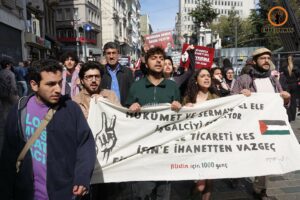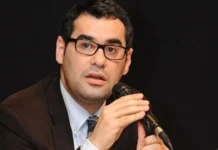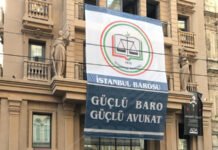Turkish police on Saturday used excessive force to disperse a group of young people who had gathered in the central İstanbul neighborhood of Taksim to demand that the Turkish government cut off its trade with Israel in light of Israel’s ongoing war on Gaza, Turkish Minute reported.
A group named “A Thousand Youths for Palestine” called for Saturday’s protest in the busy İstiklal Street, near Taksim Square. The protestors, vocal critics of the Justice and Development Party’s (AKP) ongoing trade relations with Israel despite its anti-Israel rhetoric, planned to hold a march in the street but faced violent treatment and excessive force from the police.
They were chanting “Murderer Israel, collaborator AKP,” “From the river to the sea, Palestine will be free” and “Condemning Israel isn’t enough, cut off trade” and carried banners protesting Turkey’s ongoing commercial activities with Israel.
Video footage circulating on social media showed police officers violently detaining the protestors who included headscarf-wearing women, with whom the Islamic-rooted AKP government has long been associated. They sparked outrage on social media, with many accusing the AKP of showing its true colors and its hypocrisy with its condemnation of Israel due to its war on Gaza.
Video footage posted on X showed a police officer violently shoving a headscarf-wearing protestor into a police vehicle during her detention.
“Turkey’s police are Israel’s soldiers. The mistreatment of our friends, who were beaten, handcuffed and detained, continues in police cars even though their hands are restrained. Neither the companies you protect nor the state violence that serves them can intimidate us,” the group tweeted.
A statement from the presidential Communications Directorate’s Center for Combating Disinformation, however, denied the police violence against the protestors, saying the police had to detain 43 of the protestors who refused to disperse at the end of the protest despite warnings from the police and who also insulted state officials.
The statement said 38 of the detainees were released following ID checks, while five of them were freed after questioning by the police.

Meanwhile, Turkish media reports said the detainees included two women, Kardelen Erva and Beyza, of Cengiz Akyüz, daughters of one of 10 Turkish citizens who were killed by Israeli soldiers on the Mavi Marmara, which sailed from Turkey in 2010 to take humanitarian aid to Gaza but was attacked by Israeli commandoes in international waters. The incident led to the biggest crisis ever seen in Turkish-Israeli relations.
Two police officers have been suspended due to incidents taking place during the detention of the protestors, the statement added.

The suspension of the police officers, also announced by Interior Minister Ali Yerlikaya later on Saturday, is seen as a government move to ease the public anger over the use of police force against the protestors.
Main opposition Republican People’s Party (CHP) leader Özgür Özel said in a statement on Saturday that he followed the detention of the young people protesting against trade with Israel with great sadness. Özel described the forcible detention of the protestors as violating their freedom of expression, freedom of assembly and the Turkish Constitution.
The party tasked two lawmakers with following the incident in İstanbul.
The members of “A Thousand Youths for Palestine” group, which describes itself as “a youth movement for a Free Palestine,” also organized similar protests during AKP rallies in the run-up to the March 31 local elections but faced similar obstacles from the police and AKP politicians for demanding that the government end its trade with Israel.
Anti-Israel sentiment has been running high in Turkey since Israel began pounding Gaza in retaliation for an unprecedented attack by militant group Hamas in the south of Israel on October 7, which claimed around 1,200 lives. The death toll in Gaza, in the meantime, has exceeded 33,000, according to the Gaza Health Ministry.
The trade between Turkey and Israel, some of which is conducted by people close to AKP leader and president Recep Tayyip Erdoğan despite his anti-Israel rhetoric, was first revealed by investigative journalist Metin Cihan in late November. Cihan has since then been reporting on the commerce between the two countries using official statistics and maritime traffic websites, all of which are publicly available.
Erdoğan, who long marketed himself in the Muslim world as the champion of Palestinian rights and a strong critic of Israel, has repeatedly accused Israel of being a “terrorist state” and committing “genocide” in Gaza due to Israel’s ongoing attacks on the Palestinian enclave of Gaza.
He even compared Israeli Prime Minister Benjamin Netanhayu to Adolf Hitler.
Despite his anti-Israel rhetoric, Erdoğan has faced accusations of hypocrisy due to the ongoing trade between Israel and Turkey that has shown no signs of winding down at the height of Israel’s war on Gaza and to some extent is conducted by people close to Erdoğan and his family.
Despite the ongoing conflict and Erdoğan’s condemnation, Israel remains an important trading partner for Turkey, ranking 13th on Turkey’s export list in 2023. Trade between the two countries totaled $5.42 billion last year, accounting for 2.1 percent of Turkey’s total exports, a decrease from $7 billion in 2022.
Data from the Turkish Ministry of Transportation shows that between October 7 and December 31, 2023, an average of eight ships per day made a total of 701 trips from Turkish ports to Israel. Of these, 480 sailed directly, while 221 used Turkey as a transit country. Notably, Turkish exports to Israel rose to $430.6 million in December, an increase of 34.8 percent compared to November, indicating a continued and even growing economic relationship despite the political rhetoric.
The Turkish Statistical Institute’s Foreign Trade Statistics Database showed items exported to Israel included precious metals, chemicals, insecticides, nuclear reactor parts, gunpowder, explosives, aircraft parts and weapons and ammunition.
Turkish opposition leaders criticize the apparent contradiction of the Erdoğan government condemning Israel’s military actions while maintaining robust trade relations with the country.
Meanwhile, Israeli media reported earlier this month, quoting a Turkish deputy ambassador to Israel whose name was not revealed, as having told Jacob Blitstein, director general of the Israeli Foreign Ministry, that “Erdogan’s harsh rhetoric against Israel stems from Erdogan’s political considerations in the local elections in Turkey.”
Turkey held local elections on March 31 that ended with the worst defeat suffered by Erdoğan’s AKP since its establishment in 2001. The AKP not only lost the vote in some of its previous strongholds but also suffered a decline in its numbers across the country, which led to it coming in second in the election.
The loss of public support for the AKP has been partly blamed on its ongoing trade with Israel.















